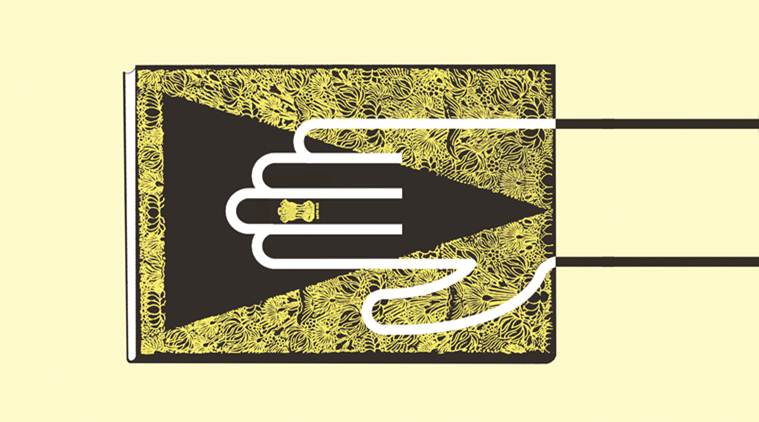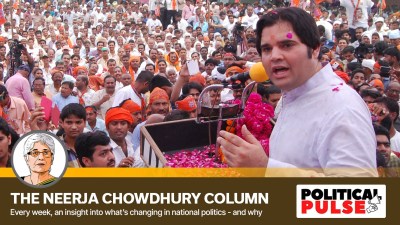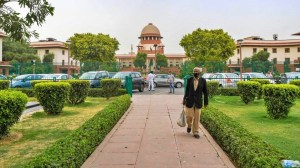- India
- International
Understand the CAA — it is a humanitarian legislation
It is the declaration by some Opposition-ruled states that they will not implement CAA, not the law itself, that is unconstitutional
 The Congress and a few other Opposition parties have been describing the CAA as an assault on secular values; they have fomented unrest across the country in the name of saving the Constitution. (Illustration by C R Sasikumar)
The Congress and a few other Opposition parties have been describing the CAA as an assault on secular values; they have fomented unrest across the country in the name of saving the Constitution. (Illustration by C R Sasikumar)
The historic Citizenship Amendment Bill was passed in Parliament’s winter session and has received the President’s assent. This move by the Centre will give long overdue-relief to the religiously persecuted minorities of Pakistan, Bangladesh, and Afghanistan. While these minorities have welcomed the Act, it is surprising that the Congress and several other Opposition parties are spreading rumours, which have led to violence in some parts of the country. Such attempts to spread rumours, create confusion and engage in vote bank politics have, of course, been the hallmark of the Congress party. It, therefore, becomes imperative to revisit the developments which led to the enactment of the Act.
The Congress and a few other Opposition parties have been describing the CAA as an assault on secular values; they have fomented unrest across the country in the name of saving the Constitution. In its present form, the Act doesn’t violate Article 14 of the Constitution. In 2003, the NDA government under the leadership of Atal Bihari Vajpayee took the first step towards the legal formalisation of a policy to grant citizenship to religiously persecuted minorities of Pakistan, Afghanistan and Bangladesh. Manmohan Singh, then an Opposition leader, had advocated a more liberal approach for granting Indian citizenship to minorities in Bangladesh. The Citizenship Amendment Rules 2004 were notified by the Ministry of Home Affairs on February 28. 2004 and published in the Extraordinary Gazette of India on March 1, 2004. The district collectors of Rajasthan and Gujarat were granted special powers to confer Indian citizenship to “Pakistani Nationals of Minority Hindu community displaced consequent to wars between India and Pakistan in the years 1965 and 1971” for one year from the operationalisation of the rules.
The period of applicability of these rules was extended by the Manmohan Singh-led UPA by gazette notifications in 2004 and 2005 — first by two years and then by three years. The Modi government has taken the cue from the UPA government: CAA, 2019 further eases the procedure for conferring citizenship to not only Hindu but also Sikh, Jain, Christian, Buddhist and Parsi communities from the three neighbouring countries. The question that inevitably arises is: When the Congress government was bringing a series of amendments in the citizenship rules to favour the Hindu minorities, where were these voices who are now terming the CAA as an assault on secularism in India and against Article 14 of the Constitution?
In its 159th report on the Citizenship (Amendment) Bill, 2011, the Parliamentary Standing Committee On Home Affairs under the chairmanship of M Venkaiah Naidu highlighted the failure of former Prime Minister Indira Gandhi to live up to the assurance of granting citizenship to the West Pakistani Hindu migrants to India. On August 10, 1949, in a Constituent Assembly discussion on citizenship, B R Ambedkar pointed out: “It is not possible to cover every kind of case for a limited purpose, namely, the purpose of conferring citizenship on the date of commencement of the Constitution. If there is any category of people who are left out by the provisions contained in this amendment, we have given the power to Parliament subsequently to make provision for them.”
In India’s federal structure, states have a constitutional obligation to implement the Citizenship Amendment Act, 2019 as passed by Parliament. As per Article 246 of the Constitution, the 17th entry under the Union List of the Seventh Schedule provides exclusive powers to Parliament to legislate on matters related to “citizenship, naturalisation and aliens”. It is tragic to note, therefore, that the chief ministers belonging to Opposition parties, despite taking the oath for bearing true faith and allegiance to the Constitution, are making a mockery of it by publicly expressing their ill-will and expressing their reluctance to to implement the CAA — this is nothing but petty votebank politics. Articles 245 and 256 of the Constitution also oblige states to ensure compliance with the laws made by Parliament. The declaration by the governments of Kerala, West Bengal, Madhya Pradesh, Chhattisgarh, Rajasthan and Maharashtra that these states will not implement the CAA is, therefore, unconstitutional. Even then, while framing the CAA’s rules, the government is considering experts’ suggestions to make the Act operational.

Item No 27 (Entry 34) of the Congress party’s manifesto for the Rajasthan Assembly election 2018 clearly promises citizenship and rehabilitation for refugees from Pakistan. The Congress and other parties have advocated the cause of religiously-persecuted minorities from time to time for vote bank politics. However, once the BJP government led by Prime Minister Narendra Modi has taken up this cause, these parties have done a volte-face.
The Opposition and extremist organisations like the Popular Front of India (PFI) have created the illusion that citizenship won’t be granted to Muslims, but that is far from the truth. Muslims will continue to get citizenship under the Citizenship Act. It is pertinent to note that over the last five years more than 3,000 refugees from Pakistan, Afghanistan and Bangladesh got Indian citizenship, 566 of them were Muslims. It is also pertinent to point out that whenever the Opposition has had to contend with the popularity of PM Narendra Modi, the nation has witnessed attempts — unsuccessful ones — to mislead the people. These include the brouhaha over the “Rafale deal”, “Award Wapsi”, “intolerance” and the historic CAA.
My appeal to all countrymen is to understand the CAA — it is a humanitarian legislation. In a vibrant democracy like India, it is never easy to mislead the citizenry. The millions of BJP karyakartas are reaching out to every household to bust the myths created by the Opposition. It is important for every individual to participate in this endeavour so that the country’s democracy is strengthened.
This article first appeared in the print edition on January 20, 2020 under the title ‘States have an obligation’. The writer is Union Minister of State for Parliamentary Affairs, Heavy Industries and Public Enterprises, Government of India.
EXPRESS OPINION
Apr 25: Latest News
- 01
- 02
- 03
- 04
- 05










































